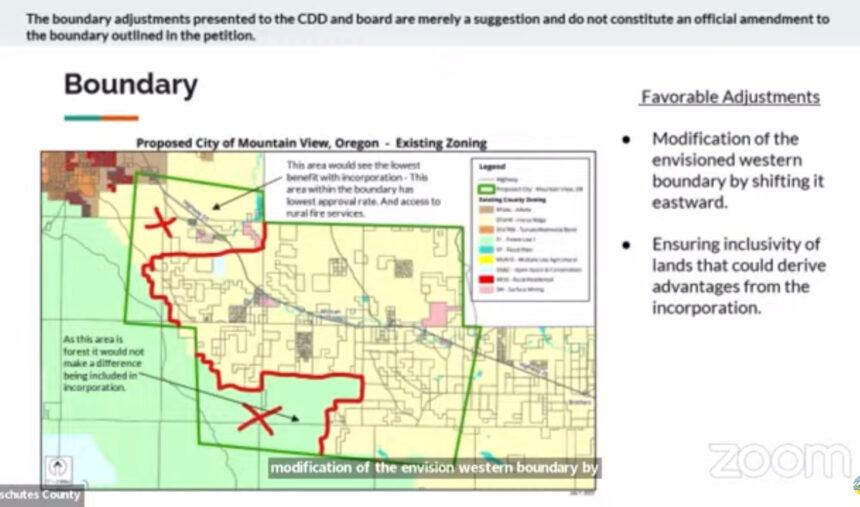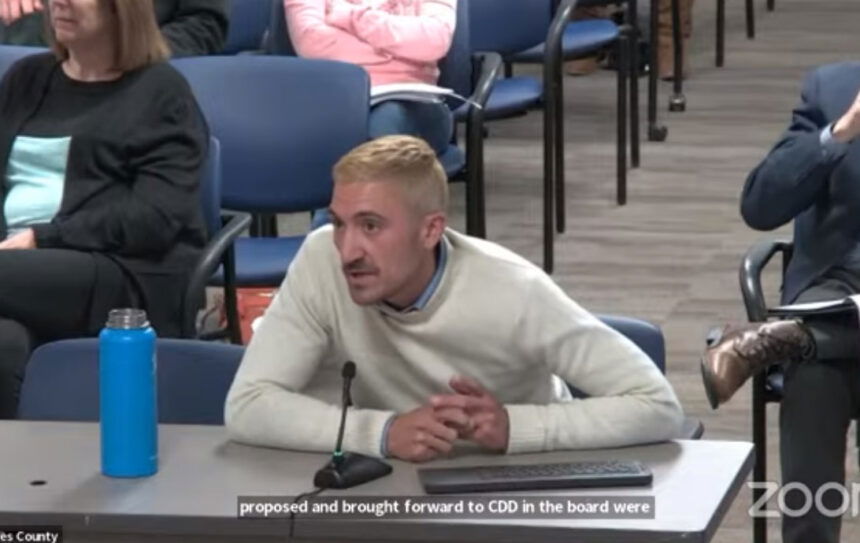Deschutes County commissioners deny petition to allow creation of vast city of Mountain View SE of Bend


(Update: Hearing held, board votes 3-0 to deny incorporation petition)
BEND, Ore. (KTVZ) – Even the notion of a revised, slightly less vast proposed city of Mountain View, still over 200 square miles southeast of Bend, failed to win favor from Deschutes County commissioners, who voted unanimously after Wednesday's public hearing to reject the incorporation petition.
Millican Valley resident Andrew Aasen tried to make the case that he and other supporters could meet the local and state land-use and other requirements the first county’s first new city since La Pine would bring. But many spoke against even trying, saying it would isn’t just a tall order, but an impossible one.
A proposed revised map -- which Aasen called "merely a suggestion," not a formal revision -- would have shifted the western boundary eastward, which Aasen said was aimed at "ensuring inclusivity of lands that could derive advantages from the incorporation."
But after taking testimony, commissioners voted 3-0 not to approve the petition and send the matter to voters (only residents in that area would have had a vote).
Commissioner Phil Chang said, “I’d like to see a more clear and detailed business plan” specifying what services would be provided and revenue available, from tax revenue, shares of state revenue and grants.
“I’m pretty skeptical that more meaningful services could be provided with the taxation rate (of $2 per $1,000 of assessed value) we’re discussing here,” Chang said.
As for complying with state land-use goals, “as we’ve heard from a number of people, it is a very heavy lift to comply with all the requirements,” he said.
Commissioner Tony DeBone, a veteran of the years-long effort that eventually led to the city of La Pine, noted that the initial proposal took in much of the south county, but was dialed back to what ended up gaining voters' and officials' approval.
After state Land Conservation and Development planners spoke of the big challenges older very small cities face, Commissioner Patti Adair said she grew up in Heppner and is very familiar with the even smaller cities, such as Lone Rock and Unity.
“It seems it’s really not quite the right decision for the community at this time,” she said, though she added. “I’d like to see some really positive things happen to that community.”
Aasen said in his presentation the goal was to “strike a balance between growth and preservation of agricultural land,” in the historical grazing area for George Millican, along with a “desire for local governance and self-determination.”
When Aasen spoke of the ability to not only seek a share of state tobacco, liquor and gas taxes but apply for state and federal grants, Chang professed strong skepticism: “Eligibility is one thing, but whether they have the wherewithal to research, apply for and administer a project is another question.”
DLCD senior urban planner Kevin Young noted the 265 square miles would be eight times the city of Bend, and said “nothing suggests urbanization of that area over time,” meaning basic fundamentals such as water, sewer and roads would be a tall order.
John Jinings, a community specialist with the state agency, said he enjoys working with the very small cities, but that they usually have a relatively small footprint, no or very little public land and while “they do have a community identity,” they “absolutely struggle to stay relevant, to keep the lights on.”
“I’m not certain at all that (incorporation) would get them what they want,” he said. “Incorporation is a marathon, not a sprint. Actually, it’s more of a gauntlet. There are overwhelming challenges to standing up a city out of nothing. I believe it would (involve) a lot of the county’s time and money, as with ours, at the expense of other” priorities and needs.
Even some residents supportive of the idea had lots of questions about how it would happen, prompting DeBone to have to ask (as the hearing was organized) if they were for or against the proposal.
One resident shared another viewpoint: “Most live out there because they don’t want to be in a community. I’ve had nobody over for cookies or coffee." He spoke of "the big ‘No Trespassing’ signs" that dot the area and said of residents: "They want to be alone ... not sit in a community center and sing Kumbaya.”
Another property owner said he was “adamantly opposed” and claimed the application had a lot of misinformation. He said the thinly populated area is more like “the Wild West,” comparing it to Bend’s Hunnell Road encampment in some ways.
He said he believed the city was “proposed by a bunch of disgruntled property owners who didn’t do their due diligence” to find out just what they could or couldn’t do with their land.
Aasen, asked after the vote if he and his supporters will appeal the county denial to the state or try again with a reworked proposal down the road, told NewsChannel 21, 'I think those questions will be answered in the coming days. I believe it is imperative to take a step back and reflect.'
--
Earlier story:
BEND, Ore. (KTVZ) – Deschutes County planners are recommending that commissioners deny a petition to begin the incorporation process for forming the vast, sparsely populated city of Mountain View, southeast of Bend.
Millican Valley resident Andrew Aasen filed the incorporation petition earlier this year for an area of 265 square miles, or nearly 170,000 acres, with the “ghost town” of Millican at its center, saying the residents deserve to have a voice in their governance and more protections and services.
But in the conclusion of their 35-page staff report for Wednesday morning’s public hearing before county commissioners (agenda is here), planners noted that to approve the petition, they must find the record shows that the boundary includes all lands that would benefit, that a proposed tax rate would support proposed services and that the city would be able to meet land-use planning requirements.
The report from Senior Planner Nicole Mardell said first off, the petitioner “has not demonstrated with substantial evidence in the record that a minimum of 150 residents live in the proposed incorporation boundary,” as state law requires for newly formed cities (though the staff report summary later mentions the petitioners' estimated population of 160).
The planner also said the proposed boundary includes 75% federal land “that will not be benefitted from being in a proposed city.”
“Staff finds the configuration of the boundary, in which private land is interspersed among large tracts of publicly owned land, poses significant challenges to promote orderly and efficient urban scale development,” Mardell wrote.
Also, she said, “Staff finds that the proposed taxation rate ($2 per $1,000 of assessed value) will not support the proposed services,” and that “the petitioner’s economy feasibility statement includes insufficient and incorrect information regarding potential city income and revenue sources.” She said the petitioner miscalculated the tax revenue, which would only bring in less than $18,000 the first year, not the $30,000 that’s stated.
The planers also say Aasen has not shown the city will be able to comply with relevant statewide planning goals and county Comprehensive Plan goals and policies.
Aasen, reached by phone Tuesday, told NewsChannel 21 he’s confident they can meet the requirements to form a new city.
“I have a lot of legal people helping me with this,” he said, disputing as an example the amount of federal land included as actually closer to 50%. “That’s part of the reason the boundary is so big,” he said, adding that they are “fairly confident we can meet the metrics.”
Aasen said he never expected the county planners to support or recommend approval of the petition, as they are “entirely concerned with money and how it will affect them.”
He also said the incorporation proposal has been in the works for three-plus years, long before he launched his non-affiliated bid for Congress this year.
